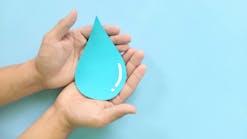WHITE PLAINS, NY, Oct. 7, 2009 -- ITT Corporation, a leading provider of pumps and systems for the movement and treatment of water and wastewater, is enabling a new wastewater treatment plant in Peru to meet that country's new stringent regulations for the reuse of effluent for agricultural applications.
The plant, located in Peru's Manchay district near Lima, is scheduled to go online during the fourth quarter of 2009. It will employ a modified sequencing batch reactor (SBR) process and tertiary filtration to produce enough treated effluent to irrigate 1,000 acres of farmland each day. The facility and its technology was described in detail during a technical presentation at this week's International Water Conference in Orlando, Florida by Anton (Tony) G. Callery, Treatment Process Business Development Manager for Latin American Operations within ITT's Water and Wastewater business.
"Peru has a critical need for biologically treated wastewater because its supply of extracted freshwater is dwindling, and 80 percent of that is currently being used for agricultural purposes," said Callery. "As a result, the country enacted new regulations in July 2008 for the reuse of wastewater, including effluent that is applied toward animal care and crop cultivation. Those regulations in turn prompted SEDAPAL, the water resources agency for Lima, to decide that ITT Water & Wastewater should collaborate on the new wastewater treatment plant with Abengoa, the project contractor. ITT was assigned responsibility for not only the facility's process design and engineering, equipment supply, and electro-mechanical installation, but also its start-up and first six months of operation."
The modified SBR process that is central to the new technology is an Intermittent Cycle Extended Aeration System (ICEAS) that has two compartments -- a pre-react zone and a main-react zone -- for treating the wastewater. At the end of the eight-hour ICEAS process, the wastewater will then undergo tertiary filtration to ensure removal of Helminth Ova, a parasite generally resistant to current forms of oxidizers and disinfectant technologies, at which point it will meet all the quality requirements for usage.
In addition to generating the treated wastewater, the plant will ultimately produce each day about 900 kilograms of dried biosolids extracted from the wastewater. These will also have agricultural application as they can be used for soil pH stabilization and to add nutrients to the soil.
"This project represents an important addition to the strong emerging economy of Peru, which is home to 30 million people, yet is so mountainous and arid that only three percent of the country's land is considered arable," said Callery. "The plant should prove especially beneficial in serving the needs of up to 70,000 residents of Manchay."
ITT is a world leader in transport and treatment of wastewater and provides a complete range of water, wastewater and drainage pumps, equipment for monitoring and control, units for primary and secondary biological treatment, products for filtration and disinfection, and related services. Its brands include Flygt®, WEDECO®, Sanitaire® and Leopold®.
About ITT Corporation
ITT Corporation is a high-technology engineering and manufacturing company operating on all seven continents in three vital markets: water and fluids management, global defense and security, and motion and flow control. With a heritage of innovation, ITT partners with its customers to deliver extraordinary solutions that create more livable environments, provide protection and safety and connect our world. Headquartered in White Plains, N.Y., the company generated 2008 sales of $11.7 billion. www.itt.com
###


